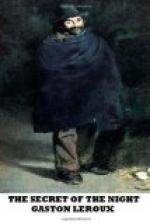“Monsieur,” Koupriane finished by saying, tugging his sleeve, “do you hear me? I pray you at least reply to me. I offer all possible excuses for speaking to you in that tone. I reiterate them. I ask your pardon. I pray you to explain your conduct, which appeared imprudent to me but which, after all, should have some reason. I have to explain to the Emperor. Will you tell me? What ought I to say to the Emperor?”
“Nothing at all,” said Rouletabille. “I have no explanation to give you or the Emperor, or to anyone. You can offer him my utmost homage and do me the kindness to vise my passport for this evening.”
And he sighed:
“It is too bad, for we were just about to see something interesting.”
Koupriane looked at him. Rouletabille had not quitted Matrena Petrovna’s eyes, and her pallor struck Koupriane.
“Just a minute,” continued the young man. “I’m sure there is someone who will miss me — that brave woman there. Ask her which she prefers, all your police, or her dear little domovoi. We are good friends already. And — don’t forget to present my condolences to her when the terrible moment has come.”
It was Koupriane’s turn to be troubled.
He coughed and said:
“You believe, then, that the general runs a great immediate danger?”
“I do not only believe it, monsieur, I am sure of it. His death is a matter of hours for the poor dear man. Before I go I shall not fail to tell him, so that he can prepare himself comfortably for the great journey and ask pardon of the Lord for the rather heavy hand he has laid on these poor men of Presnia.”
“Monsieur Rouletabille, have you discovered something?”
“Good Lord, yes, I have discovered something, Monsieur Koupriane. You don’t suppose I have come so far to waste my time, do you?”
“Something no one else knows?”
“Yes, Monsieur Koupriane, otherwise I shouldn’t have troubled to feel concerned. Something I have not confided to anyone, not even to my note-book, because a note-book, you know, a note-book can always be lost. I just mention that in case you had any idea of having me searched before my departure.”
“Oh, Monsieur Rouletabille!”
“Eh, eh, like the way the police do in your country; in mine too, for that matter. Yes, that’s often enough seen. The police, furious because they can’t hit a clue in some case that interests them, arrest a reporter who knows more than they do, in order to make him talk. But — nothing of that sort with me, monsieur. You might have me taken to your famous ‘Terrible Section,’ I’d not open my mouth, not even in the famous rocking-chair, not even under the blows of clenched fists.”
“Monsieur Rouletabille, what do you take us for? You are the guest of the Tsar.”
“Ah, I have the word of an honest man. Very well, I will treat you as an honest man. I will tell you what I have discovered. I don’t wish through any false pride to keep you in darkness about something which may perhaps — I say perhaps — permit you to save the general.”




